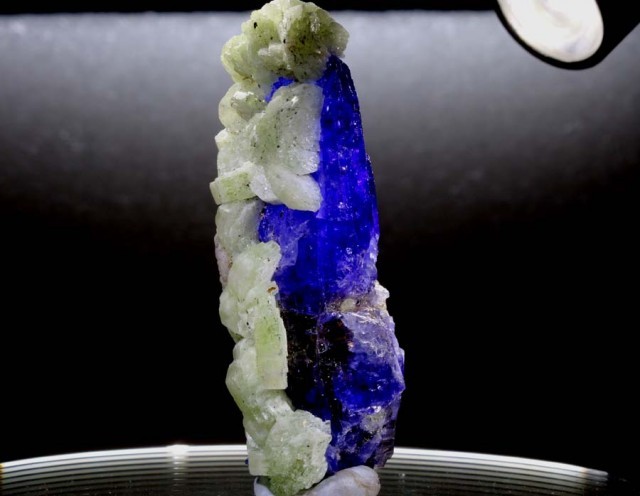Ver todas las fotos (:contar)
630 CTS GEM QUALITY PALLASITE SLAB SERICHO KENYA TBM-2159
- SKU
- TBM-2159
- Dimensiones (mm)
- 110.000 x 70.000 x 5.000mm
- Peso (cts)
- 630.000
- Treatment
- No Treatment
- Tipo
- Specimen
- Colores
-
Sericho Meteorite
PALLASITEKENYA
BI COLOURED SHUCKED OLIVINES
The Sericho pallasite meteorite was officially "discovered" in 2016 when some large masses were purchased from villagers in Isiolo County, Kenya. However, the meteorites were known for much longer with tales of the larger masses being played on when villagers were children. Sericho meteorites are found in a strewn field over 45km long with pieces weighing from less than one kilogram to masses as large as 500 kilograms.
The olivine crystals of Sericho are generally rounded and vary in color from gemmy green to orange. The metal-rich areas of the Sericho pallasite show well-developed Widmanstätten patterns. Small individual pieces of the meteorite often show evidence of having been torn apart. Some pieces have patches of remaining fusion crust. The meteorite continues to be collected from the area with over 2.8 tons recovered as of the time it was officially classified.
Modern meteoriticists use the term "pallasite" to describe a certain structural class of stony-iron meteorites that contains abundant silicate inclusions in a nickel-iron matrix. Usually, the silicates are large olivine crystals, often of gem quality. These peridots make the pallasites some of the most attractive meteorites known, and cut and polished pallasite slices are highly coveted among meteorite collectors. Sometimes pallasites and pallasitic peridots are used in jewelry, making them the only genuine cosmic gemstones on Earth.
Based on their origin and formation history, the pallasites are regarded as samples of core/mantle boundary material from differentiated asteroids, inferring that a close relationship exists to the iron meteorites. Upon etching, larger metal portions of polished slices display typical Widmanstätten figures. In addition to this, pallasites display chemical, elemental, and isotopic trends that link them to specific chemical groups of iron meteorites, linking their origin to a common parent body. Hence, they are classified into three distinct groups or grouplets, similar to the chemical groups of the iron meteorites: (1) the main group pallasites, (2) the Eagle Station grouplet, and (3) the pyroxene grouplet.
- SKU
- TBM-2159
- Dimensiones (mm)
- 110.000 x 70.000 x 5.000 mm
- Peso (cts)
- 630.000
- Treatment
- No Treatment
- Tipo
- Specimen
- Colores
-
Sericho Meteorite
PALLASITEKENYA
BI COLOURED SHUCKED OLIVINES
The Sericho pallasite meteorite was officially "discovered" in 2016 when some large masses were purchased from villagers in Isiolo County, Kenya. However, the meteorites were known for much longer with tales of the larger masses being played on when villagers were children. Sericho meteorites are found in a strewn field over 45km long with pieces weighing from less than one kilogram to masses as large as 500 kilograms.
The olivine crystals of Sericho are generally rounded and vary in color from gemmy green to orange. The metal-rich areas of the Sericho pallasite show well-developed Widmanstätten patterns. Small individual pieces of the meteorite often show evidence of having been torn apart. Some pieces have patches of remaining fusion crust. The meteorite continues to be collected from the area with over 2.8 tons recovered as of the time it was officially classified.
Modern meteoriticists use the term "pallasite" to describe a certain structural class of stony-iron meteorites that contains abundant silicate inclusions in a nickel-iron matrix. Usually, the silicates are large olivine crystals, often of gem quality. These peridots make the pallasites some of the most attractive meteorites known, and cut and polished pallasite slices are highly coveted among meteorite collectors. Sometimes pallasites and pallasitic peridots are used in jewelry, making them the only genuine cosmic gemstones on Earth.
Based on their origin and formation history, the pallasites are regarded as samples of core/mantle boundary material from differentiated asteroids, inferring that a close relationship exists to the iron meteorites. Upon etching, larger metal portions of polished slices display typical Widmanstätten figures. In addition to this, pallasites display chemical, elemental, and isotopic trends that link them to specific chemical groups of iron meteorites, linking their origin to a common parent body. Hence, they are classified into three distinct groups or grouplets, similar to the chemical groups of the iron meteorites: (1) the main group pallasites, (2) the Eagle Station grouplet, and (3) the pyroxene grouplet.
| Proveedor de envío | Envío a: país | Envíos al resto del mundo |
|---|---|---|
| Standard Shipping - Tracked | $20.00 / :días días | $30.00 / :días días |
|
:país
:proveedor tiene un descuento de $25.00 en pedidos con 2 o más artículos
Resto del mundo
:proveedor tiene un descuento de $30.00 en pedidos con 2 o más artículos
|
||
| FedEx | $40.00 / :días días | $40.00 / :días días |
|
:país
:proveedor tiene un descuento de $40.00 en pedidos con 2 o más artículos
Resto del mundo
:proveedor tiene un descuento de $40.00 en pedidos con 2 o más artículos
|
||
| DHL | $30.00 / :días días | $30.00 / :días días |
|
Resto del mundo
:proveedor tiene un descuento de $30.00 en pedidos con 2 o más artículos
|
||

-
 Positivo
PositivoVery pleased with the specimen and transaction
-
 Positivo
PositivoSweet Thank you
-
 Neutral
NeutralResponsive seller, which is appreciated. Lovely gem. The only issue was with shipping. I paid for post but it was sent via Fedex. Fedex (of course) charged me illegal fees over a month after delivery! This was why I chose post and not Fedex.
-
 Positivo
PositivoPaid and shipped - no feedback left after 100 days





















![71.15 CTS TIBETIAN CRYSTAL SCEPTUR PARCEL [MGW800A26]](https://liveplatforms-production.b-cdn.net/tenants/gr/uploads/images/435000-439999/436926/53d6fa4d8740e.JPG?width=480&aspect_ratio=1001%3A1000)
